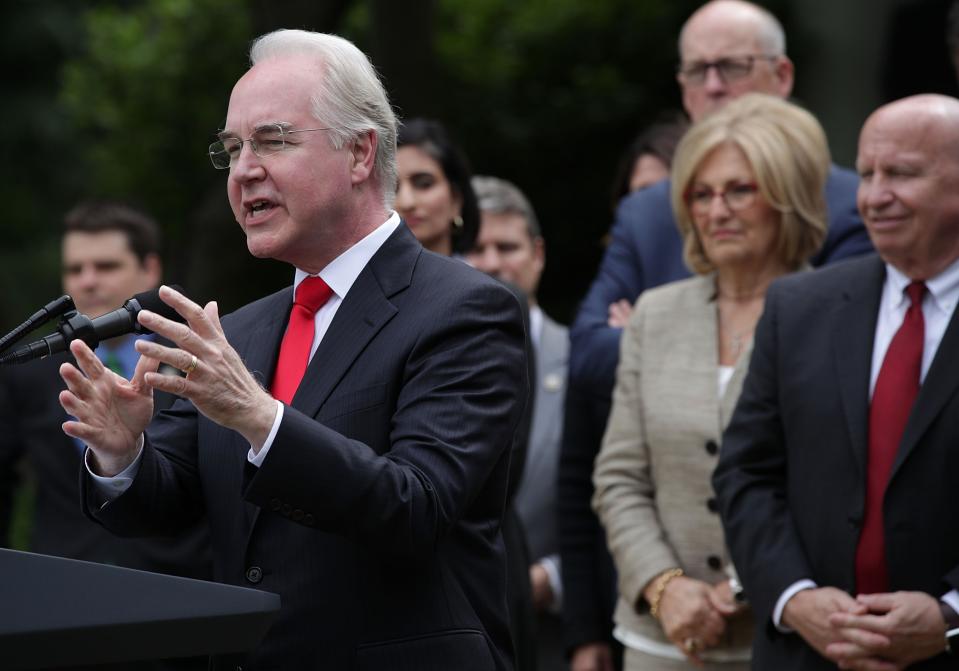Insurers are fleeing Obamacare, and Trump is helping

The deadline for health insurers to decide whether to participate in the Obamacare exchanges in 2018 was moved from May 3 to June 21, giving insurers a little more time to decide whether to participate.
The outlook is not rosy so far. In Connecticut, for example, rates have shot up considerably for people buying insurance in the open market, and premiums have followed, rising 19% to 52%, the Hartford Courant reported.
In addition to rising medical costs, a big problem for insurers is uncertainty. Insurers have been asking themselves two big questions: Will there be enough healthy people signing up for plans and will the Trump administration continue to pay subsidies to insurers?
The Trump administration has indicated it will not enforce the ACA mandate that requires consumers to maintain coverage, so some healthy people will be less motivated to buy insurance. This makes the pools less healthy and more expensive for insurers, causing premiums to go up. According to Vox, the mandate’s weakening by the administration has caused Maryland’s CareFirst to hike premiums 15%.
Though insurers were uncertain whether the administration would continue paying subsidies the House contests as unlawful, the administration said it would in April. The future, however, is unclear—and these payments are being used for as a political cudgel. Insurance companies are beginning to run away
The market’s adverse conditions are not making insurance companies happy, and some have already announced they will not participate in the 2018 exchanges.
Exits so far:
Aetna (AET) is leaving Iowa, Virginia, and now Delaware and Nebraska
Wellmark Blue Cross Blue Shield is leaving Iowa
Humana (HUM) is exiting completely (but is not a large insurer through the individual market)
Possible exits:
Medica has been rumored to be leaving Iowa, but did not respond to inquiries from Yahoo Finance to confirm its exit.
Around 32% of the 9.2 million people enrolled through ACA exchanges have only one choice of insurer according to the Kaiser Family Foundation, putting them in a precarious position should their sole insurer exit. This currently includes Alabama, Alaska, Oklahoma, South Carolina, and Wyoming. The number had increased dramatically from 7% in 2016 because of UnitedHealth leaving.
According to Axios and the Robert Wood Johnson Foundation, should Anthem (ANTM) exit all its markets in 2018, over 250,000 people will have no insurer to choose from. If Cigna (CI) or Centene (CNC) do, the number would be around 100,000 each.
With insurers exiting, some people could be left without any insurance options at all. As House Majority Leader Kevin McCarthy put it: “You know what doesn’t cover pre-existing conditions?” McCarthy said on the House floor on May 4. “A healthcare system that doesn’t have coverage. No options means no coverage.”
The ACA repeal bill, the American Health Care Act (AHCA), McCarthy helped shepherd through the House may not be any better. It allows states to seek waivers that lets insurers hike up costs for people with pre-existing conditions like pregnancy, sleep apnea, and eating disorders, pricing them out.
Why this is still important with the AHCA’s progress
President Trump and GOP leaders may have celebrated the AHCA in the White House’s Rose Garden last week, but the Affordable Care Act is still very much the law of the land. Now the bill must run through the gauntlet of a critical Senate and will likely make a trip back to the House before it lands on Trump’s desk.
This means that most likely Obamacare is a step closer to death, but until Trump signs the new bill into law, consumers have no choice but to continue participating in the current system. Unfortunately for them, however, the Trump administration is throwing gas on the fire by driving up premiums and scaring insurers by not enforcing the mandate and being cagey about whether it will continue payments.
Update 5/10: Aetna has also withdrawn ACA exchanges in Nebraska and Delaware.
Ethan Wolff-Mann is a writer at Yahoo Finance focusing on consumer issues, tech, and personal finance. Follow him on Twitter @ewolffmann. Got a tip? Send it to [email protected].
Read more:
Airlines are giving crews leeway to hand out money when necessary
Banks take just 90 seconds to approve a credit card. Here’s what they look for.
Uber’s new tipping dilemma: low prices or smooth experience
Zuckerberg at Facebook conference: if you take one thing away—this is it
The cost of unifying North and South Korea
The trick to getting credit card fees waived? Just ask
Chase’s Sapphire Reserve is very worth it, even with its slashed bonus